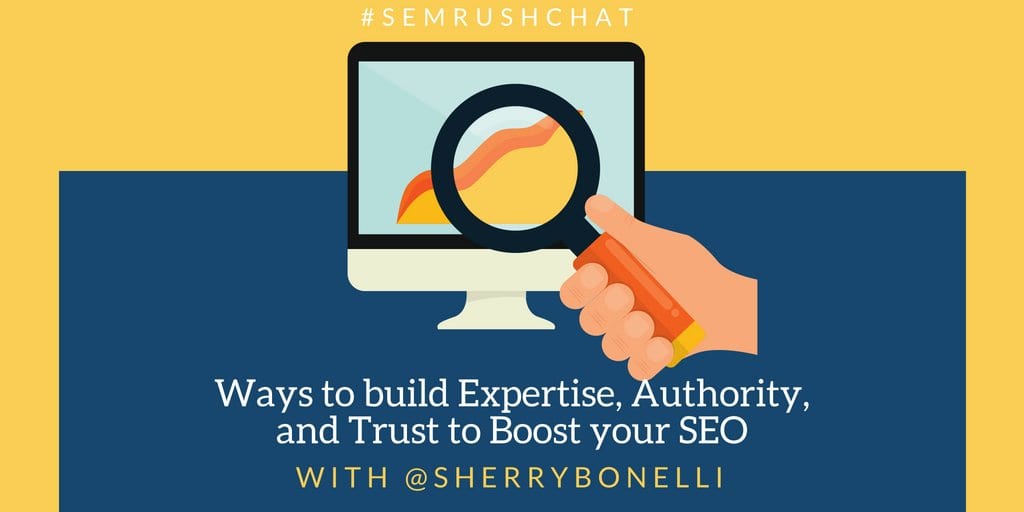Here’s my updated take on the latest #semrushchat I participated in last week on Twitter. If you want to rank well on Google, you need to build Expertise, Authority, and Trust (E-A-T) on your website. This discussion goes into detail on ways to incorporate these elements into your overall SEO strategy. I was trying to answer all the questions first, so the #semrushchat #lightninground was born!
Together with
@sherrybonelli and you guys, we’ll discuss:Ways to build Expertise, Authority, and Trust to Boost your SEO!
#semrushchat
pic.twitter.com/emAxMEkW13— SEMrush (@semrush)
August 22, 2018
Before diving into the specifics, let’s revisit what “authority” means in SEO. In the simplest terms, it’s a predictor of how well a site will rank and gives a glimpse into the SEO “strength” of a website. If you’re curious, I use Ahrefs to evaluate a website’s authority, along with Majestic and Mozbar to analyze domain authority as well.
#A1
#semrushchat In my opinion, the *fastest* way to build authority using SEO is cranking out great pages containing (better) information about the subject matter than anyone else.— Matt Roberts (@1PwnNoobs)
August 22, 2018
Focusing on the fastest way to build authority is important, but quality is also critical. If you can create stellar content related to the subjects you want to rank for, your website will perform better. Bill Slawski, one of the best SEOs in the field, so eloquently put it:
A1 Become indispensable; a source of information and expertise on topics that people have an interest in, so that you become the go-to person on topics (Not convinced that there is an instant way to do this – it involves rolling up sleeves and working.)
#SEMRUSHChat— Bill Slawski ⚓ (@bill_slawski)
August 22, 2018
Question two shifts to the key on-site areas for building trust and authority. Often, I see people making all kinds of on-site SEO mistakes that prevent them from ranking well. These are the top three areas to focus on:
Q2. What are the top three on-site areas where a site can build trust and authority?
#semrushchat1. Answer people’s common questions you’ve researched beforehand.
2. Show off positive reviews.
3. Display must-have info so people can see answers fast.— Matt Roberts (@1PwnNoobs)
August 22, 2018
It’s crucial to provide relevant answers to the questions people are searching for. Showing off positive customer reviews is also a priority because it’s a proven way to build trust, which, in turn, will improve conversions.
A3: Google establishes “experts” based on first-person experience in addition to formal education or training. Links are still the core authority signal in Google’s algorithm, and they measure trust in their algorithm with TrustRank.
#semrushchat— Matt Roberts (@1PwnNoobs)
August 26, 2018
Question 3 isn’t new, as Google’s E-A-T factors have been well known for a while. It boils down to a strong combination of quality content and trustworthy links 😉.
Q4. #semrushchat
Start with helping clients understand what their customers actually care about (and what those potential customers are actually searching for). Get the strategy right before you start attempting tactics.
— Matt Roberts (@1PwnNoobs)
August 22, 2018
When I speak to clients about who they want to attract to their website, and what they want to sell, there’s often a disconnect between what they think their audience cares about and what potential customers are actually looking for. Focusing on user intent can lead to much better performance for a website.
For local businesses like realtors and plumbers, you need to stand out from a sea of competitors. You must show people why you’re unique and what your competitive advantages are. Customers will listen more if you quickly show them you understand their problems.
Q5. What are the main metrics you would use when identifying good brand authority?
#semrushchat0. Backlinks
1. Rankings
2. Reviews
3. Engagement
4. TrafficI’d start with those.
